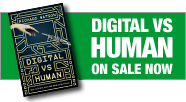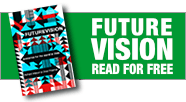Top Trends in Science, technology & design
1. Nanotech
 Nanotechnoloy (i.e.the manipulation of structures at an atomic level — or the science of very small things) is the hyped technology of the new millennium. It’s unlikely to disappoint either because it’s a disruptive technology. Nanotech will effect every industry from toothpaste to car tyres and from to glass to clothing. Also expect a major Nanotech accident by around 2025 (see Bill Joy’s article entitled ‘Why the future doesn’t need us’).
Nanotechnoloy (i.e.the manipulation of structures at an atomic level — or the science of very small things) is the hyped technology of the new millennium. It’s unlikely to disappoint either because it’s a disruptive technology. Nanotech will effect every industry from toothpaste to car tyres and from to glass to clothing. Also expect a major Nanotech accident by around 2025 (see Bill Joy’s article entitled ‘Why the future doesn’t need us’). Read/post comments on this trend (currently 1 comment)
2. The rise of the machines
 Expect computers to become more intelligent than humans by about 2025. At this point humankind will be faced with something of a dilemma. If machines become more intelligent than their makers, what’s to stop them taking over? You could of course design machines with certain in-built controls (see I Assimov’s Robot Rules in I Robot) but there will be a very strong temptation for mankind to see what would happen if you don’t. The other intriguing (if not outright alarming) aspect of this issue is the convergence of computing, robotics and nanotechnology which could give rise to self-replicating machines. Add to this the possibility of not only downloading intelligence into a machine but downloading consciousness too, and you are faced with the question of whether it is better to live forever in a machine or live for a limited time as a carbon based biped.
Expect computers to become more intelligent than humans by about 2025. At this point humankind will be faced with something of a dilemma. If machines become more intelligent than their makers, what’s to stop them taking over? You could of course design machines with certain in-built controls (see I Assimov’s Robot Rules in I Robot) but there will be a very strong temptation for mankind to see what would happen if you don’t. The other intriguing (if not outright alarming) aspect of this issue is the convergence of computing, robotics and nanotechnology which could give rise to self-replicating machines. Add to this the possibility of not only downloading intelligence into a machine but downloading consciousness too, and you are faced with the question of whether it is better to live forever in a machine or live for a limited time as a carbon based biped. Read/post comments on this trend (currently 0 comments)
3. Discipline convergence
 If the convergence of computing and communications led to the Information Age, then perhaps we are on the cusp of another dramatic shift. Engineering and computing started to converge some time ago and other disciplines are following suit. For example, natural sciences like biology are merging with physical sciences like engineering. In automobiles, what was essentially an engineering industry is merging with areas like computers, while computing itself is being greatly influenced by biology and neuroscience. Of course, historically science started off as one discipline, which only fragmented into a series of specialisations in the 19th and 20th centuries - so perhaps we’ve been here before. However, our education system is still predicated on the idea of specialisation.
If the convergence of computing and communications led to the Information Age, then perhaps we are on the cusp of another dramatic shift. Engineering and computing started to converge some time ago and other disciplines are following suit. For example, natural sciences like biology are merging with physical sciences like engineering. In automobiles, what was essentially an engineering industry is merging with areas like computers, while computing itself is being greatly influenced by biology and neuroscience. Of course, historically science started off as one discipline, which only fragmented into a series of specialisations in the 19th and 20th centuries - so perhaps we’ve been here before. However, our education system is still predicated on the idea of specialisation. Read/post comments on this trend (currently 0 comments)
4. The very big and the very small
 The two most exciting frontiers in science are, arguably, the far-flung reaches of space and the exploration of the human life at a microscopic level and beyond. Watch this (very small and very big) space.
The two most exciting frontiers in science are, arguably, the far-flung reaches of space and the exploration of the human life at a microscopic level and beyond. Watch this (very small and very big) space. Read/post comments on this trend (currently 0 comments)
5. Ethics
 Robotic soldiers anyone? They’re coming but should such machines feel pain or regret? And if (when) there’s an accident, who should be held responsible? Would you trust a robot to administer a general anaesthetic and perform general surgery on you? These are just some of the questions that are already popping up as science and technology move centre stage.
Robotic soldiers anyone? They’re coming but should such machines feel pain or regret? And if (when) there’s an accident, who should be held responsible? Would you trust a robot to administer a general anaesthetic and perform general surgery on you? These are just some of the questions that are already popping up as science and technology move centre stage. Read/post comments on this trend (currently 0 comments)
6. Identity solutions
 Once upon a time, a signature and a photograph were all you needed to prove that you were who you said you were. But in anxious digital times, we need to be able to prove it beyond reasonable doubt in a variety of physical and virtual situations. Cue biometrics, verbal signatures, body scanning and even ‘signatures’ based on body smell.
Once upon a time, a signature and a photograph were all you needed to prove that you were who you said you were. But in anxious digital times, we need to be able to prove it beyond reasonable doubt in a variety of physical and virtual situations. Cue biometrics, verbal signatures, body scanning and even ‘signatures’ based on body smell. Read/post comments on this trend (currently 0 comments)
7. Product and device convergence
 One of the key drivers of global change is the convergence of technologies. This is, in turn, driving the convergence of products and ultimately services. (also see discipline convergence).
One of the key drivers of global change is the convergence of technologies. This is, in turn, driving the convergence of products and ultimately services. (also see discipline convergence). Read/post comments on this trend (currently 0 comments)
8. RFID
Radio Frequency Identification Devices (RFIDs) is a technology that uses an antenna, transceiver and transponder in conjunction with the radio frequency part of the electromagnetic spectrum to identify objects, animals or people. RFIDs are similar to barcodes except that scanning can take place remotely or covertly. The primary use for RFIDs is logistics — finding things and tracking things — but they can also be used to trigger actions — anything from unlocking a door to carrying out a transaction.Read/post comments on this trend (currently 0 comments)
9. Time and place shifting
 Products such as TiVo allow users to time shift their TV viewing habits. Similarly, Apple’s i-Pod, like Sony’s Walkman before it, allows users to shift their music listening to any place they like. So what if, in the future, you could be in two places at the same time or physically travel backwards or forwards in time? This is pure science fiction of course, but science and technology are allowing us to literally look back and forward in time, for example to identify future genetic time-bombs inside our bodies.
Products such as TiVo allow users to time shift their TV viewing habits. Similarly, Apple’s i-Pod, like Sony’s Walkman before it, allows users to shift their music listening to any place they like. So what if, in the future, you could be in two places at the same time or physically travel backwards or forwards in time? This is pure science fiction of course, but science and technology are allowing us to literally look back and forward in time, for example to identify future genetic time-bombs inside our bodies. Read/post comments on this trend (currently 1 comment)
10. Climate change
 This doesn’t quite fit here, but it doesn’t quite fit anywhere else either. Nevertheless, it’s important that climate change features somewhere on a list of major trends. Apart from the odd experts (and let’s face it, experts can be very odd), most intelligent people would accept that something is happening to the world’s weather. The only question is what. Some people say it’s going to get colder and wetter while others say it’s going to get hotter and drier. Let’s just say those things are changing. After all, what is ‘normal’ weather depends entirely on how far back you want to go. Oh, and by the way, how arrogant of the human species to think that we have a right to exist forever. Maybe our time is simply coming to an end?
This doesn’t quite fit here, but it doesn’t quite fit anywhere else either. Nevertheless, it’s important that climate change features somewhere on a list of major trends. Apart from the odd experts (and let’s face it, experts can be very odd), most intelligent people would accept that something is happening to the world’s weather. The only question is what. Some people say it’s going to get colder and wetter while others say it’s going to get hotter and drier. Let’s just say those things are changing. After all, what is ‘normal’ weather depends entirely on how far back you want to go. Oh, and by the way, how arrogant of the human species to think that we have a right to exist forever. Maybe our time is simply coming to an end? Read/post comments on this trend (currently 0 comments)


